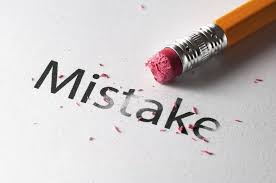
29 May Unlucky Thirteen: 13 Mistakes New Investors Make
These are all mistakes that I have made, so I’m not pointing fingers. I urge you to learn from my mistakes.
1. Rushing to buy. In 2004, I called myself a full-time real estate investor yet I had never owned any real estate. With my hard-earned money burning a hole in my pocket, I bid sight unseen on a 5-unit property in inner-city Philadelphia because the flier at an auction showed a pro forma capitalization rate of 17 percent. That was a costly mistake and a valuable learning experience. I recklessly bought the property with no due diligence because I felt the urge to buy something. I would have been better off buying a fixer-upper duplex in which I lived in one and rented the other (I did that later on).
2. Not performing due diligence. Many novice investors regret not performing a formal home inspection. I lost a tremendous amount of money on a mixed-use property because prior to the purchase I did not bother to consult the township’s Zoning Officer on what it would take to build an extra apartment on the second floor. Later on, after buying the property, I discovered that the cost to obtain proper approval to build the apartment was far more than I could afford. I ended up selling the property for a massive loss.
3. Paying too much for a property. There is a popular saying that you make the money on the buy. In other words, you create the profit potential by purchasing at the right price. It’s easy to get carried away in a multiple offer scenario or at an auction. Too many novice investors overpay for the property they buy, and they only discover that fact months later. On my first residential purchase, the appraiser for my mortgage loan pulled me aside and told me that I was paying too much for the property. I continued with the purchase because I wanted to prove to him that I was right (I wasn’t) and because I purchased it at an auction with no contingency clauses so I would have lost my 10 percent deposit (I should have hired a Realtor® to help me find investment properties).
4. Asking family and friends for money. I have done this more than once and regretted it every time. Thankfully I stopped years ago. It is easy to become excited about the prospect of buying an investment property with all the promise of the lucrative profit it could generate. Leaning on a relationship with a family member or good friend to receive seemingly easy private money with little to no paperwork involved can be enticing. Plus if we think that they will also profit handsomely, then it is a slippery slope. Think twice about asking loved ones for money, and be fine with obtaining money from other sources.
5. Not factoring in soft costs. Many new investors overlook closing costs, property management fees or agent commissions, and carrying costs. I learned this lesson on my first sale when I had $6,000 in unanticipated closing costs that I discovered the day before the settlement. I was selling the property as an unrepresented seller (For Sale By Owner), and I should have done better math to avoid the shock of the surprise costs.
6. Overimproving a property. I went waaaayyyyy overboard on my first renovation project. The strategy was to hold it as a long-term rental, and I kept spending money (cash first, then credit cards when the cash ran out) like there was no tomorrow. I bought top of the line interior doors, custom made cast iron railings, an expensive new roof because of the warranty and financing options they offered, and decorative light fixtures. I did not obtain a second quote on most of the work, and in retrospect I would have saved money had I shopped around for contractors. I still own that house 15 years later, and it is still upside down on the value. (At least it is a stable rental that produces tons of cash flow.)
7. Hiring a bad contractor. I lost $15,000 with a bad contractor on my first major renovation project. I hired him for a $500 demolition job, and he and his crew were great. Then I hired him for a big project, and that’s where I made huge mistakes. First, I should have gotten at least one competitive bid from another contractor. Second, he asked for 50 percent of the money up front. I should have negotiated a lower amount. Third, he asked me for an advance on the final payment even though most of the work was not completed. I paid him because I thought he would be like me – a person who finishes a project. I lost my leverage with him because there was little incentive for him to finish the work. Fourth, he stole a $60 light fixture I had in my house that he was supposed to install, and I imagine he installed it in another house. Fifth, one of his crew members stole my razor blades from my bathroom and then they were mysteriously returned when I complained. Sixth, he ignored many of my phone calls. I learned painful and valuable lessons that I hope to impart on you.
8. Taking too long to renovate. Regardless of whether you are renting or flipping a house, speed matters. I am not talking about rushing a renovation to the point where the quality of work suffers or you pay a pretty penny to have contractors work overtime. I am talking about planning a realistic renovation time frame up front and sticking to it. I have had friends and clients who are aspiring flippers take over a year to renovate a house. In each instance, they typically tried to do all the work themselves and also took time off of the project to work elsewhere. While the long term capital gains tax is lower for assets held more than a year and a day, there really is no compelling reason to take over a year. Think of all the lost rent payments or the monthly interest on the mortgage loan. Those are soft costs that many new investors fail to calculate.

9. Asking too much for the rent or for the asking price. It happens over and over with newbie investors. Their asking rent is too high for the market, and the unit sits empty for months. Or as a flipper, the asking price is above the market value and the property becomes stale. Home buyers often ask about the days on market. A seller has the most power on day 1 of the listing, and their power diminishes ever so slightly with each passing day. At a certain point, a buyer may smell blood in the water on a house that has been on the market for weeks or months. Many new investors ask for too much money because they are trying to recoup the extra money they spent on the renovation. There is another factor known as the endowment effect. This psychological principle holds that we tend to value things more highly when we already own them, leading us to consistently overvalue our possessions. Listen to your Realtor®; listen to the market; and price it right.
10. Underestimating the renovation costs and not sticking to the budget. There are investors who do not have a budget, and that in and of itself is a big mistake. To blow past the budget is another mistake. Underestimating the cost of the renovation is a common mistake of investors. To mitigate this, it is ideal to hire a home inspector and then obtain one or more contractor estimates prior to purchasing the property. Just how it is essential to drive with headlights at night, an investor needs to see the road ahead.
11. Having the wrong people around them. Almost everyone who takes a risk will have naysayers and free advice givers chomping at the bit to speak their mind. Also, many new investors unnecessarily bring on a partner or partners to fill a void in confidence, expertise, or money. First, if you are married, your spouse should be in alignment with your real estate investment plans. If they are not, it may be due to their concerns about risk or your time away from home. You can mitigate risk, and you can leverage your time by hiring others. If you cannot become aligned with your spouse, then it may be better to change how you invest in real estate (maybe invest in a Real Estate Investment Trust or a syndicate) or perhaps choose a different investment vehicle that fits with both of you. As for naysayers and free advice givers, I suggest you listen nicely and go do what you think is best. While there have been many instances in my life where free advice was valuable, I personally prefer to pay for advice from professionals. Finally, we come to the topic of business partners. I am not against having one or more partners if they add tremendous value and there is an ongoing synergy. I urge you to examine why you think you may need a partner. Sometimes a coach or a great mentor will cost you a lot less than a partner who receives 50 percent of the profit. Also, a bad partner can cost you more than 100 percent of your investment.
12. Paying too much for money. I have made this mistake before, paying 11 percent or more for money to purchase and renovate properties. Points, fees, interest, late charges, prepayment penalties, and other costs eat away at your profit margin. Some new investors borrow private money and give up a large percentage of the profit – even 50 percent or more – to the lender. I have had a number of novice investors tell me that they would be happy making just a little money, and while that is a nice expectation, I know they would be happier keeping even more money. Shop around for loans and be slow to give away large percentages of your profit.
13. Giving up way too quickly. I lost money on four of my first six deals. I was a full-time real estate investor, and I had no other source of income. I am so glad I did not give up. I saw real estate investing as a journey of personal growth. I knew that successful people make more mistakes than unsuccessful people. I hope your mistakes are not catastrophic. I hope you wear your mistakes like a badge of courage. There is nothing wrong with getting out of real estate investing, yet if you know this is your path to wealth then I urge you to stay the course.






No Comments